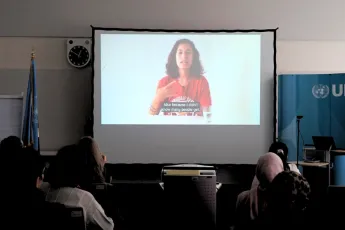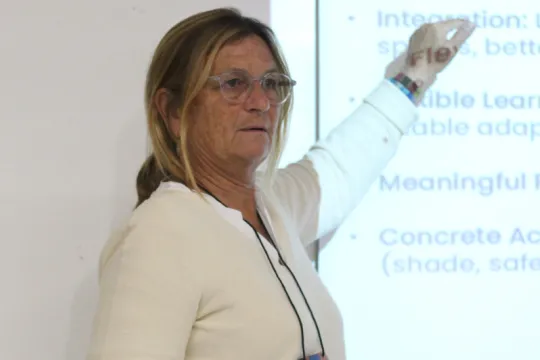
Languages are a bridge to other people and cultures and a means to express beliefs and knowledge. In transformative communication, linguistic diversity therefore deserves to be highlighted for its critical role in raising awareness, fostering dialogues, and inspiring climate action. In celebration of International Mother Language Day, the UN Climate Change content unit and UNU-EHS' Transformative Urban Coalitions (TUC) team organized a cinematic journey featuring a curated selection of short films, each in a different language and context. The session celebrated and advocated for linguistic and cultural diversity as a cornerstone of socially inclusive climate action, in which each film showed the human stories behind efforts taken. The session was open to all UN Bonn staff, who were invited to share their voice and experience with intercultural exchange while engaging in a vibrant discussion on culture and how linguistic diversity can be harnessed for more socially inclusive climate action.
Experts from UNU-EHS' TUC team outlined the transformative role of arts and films in advancing urban transformations, drawing from their experiences of working with five cities in Latin America. Linguistic diversity played a crucial role in this endeavour, with content made accessible in Spanish – the most widely spoken language in Latin America – Portuguese and English. The hybrid session hosted almost 80 attendees and included a short Portuguese-language documentary by filmmakers Dirk Wilutzky and Mathilde Bonnefoy for the TUC project. “Voices On The Ground” (2023), sharing the input of Lahys Barros, an architect and urban planner involved in the Brazilian MTST political movement. In her native Portuguese, Lahys described her militant work and how she advocates for decent housing for homeless workers, while additionally sharing insights on her participation in the 'Urban Lab' in Recife.
Approaching linguistic diversity through a social justice lens, the TUC project prioritizes meaningful communication and exchanges. Creative formats and translated content ensure equal access to information between the project participants and a wider public, facilitating effective communication between different languages and cultural contexts. For this purpose, TUC films expose global and local narratives that can evoke empathy, scientific understanding, or both. Ultimately, they resonate with diverse audiences in different territories, addressing the needs for and expectations of urban change. TUC's multilingual approach has contributed to fostering the social inclusivity needed to break down language barriers among Latin American cities, enabling knowledge exchange for climate action. Through transformative communication, TUC films inspire climate action by portraying narratives to global and local audiences. In conclusion, UNU-EHS' role in the TUC project is to facilitate meaningful engagement in open dialogues about social justice and what climate change entails locally to global audiences.

